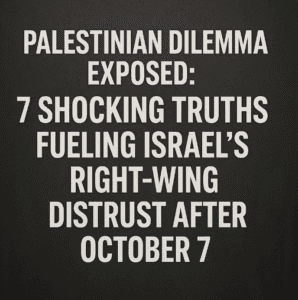Palestinian Dilemma Exposed: 7 Shocking Truths Fueling Israel’s Right-Wing Distrust After October 7
Post-October 7, Israel’s right-wing grapples with deepened distrust toward Palestinian society, fueled by scenes of civilians joining Hamas’s atrocities and celebrations of violence. While the right spans a spectrum—from proponents of annexation to those open to limited autonomy—shared concerns dominate: a perceived culture of incitement, corrupt leadership, and polls indicating widespread Palestinian support for Hamas’s actions. Decades of rejected peace offers, coupled with educational and media narratives erasing Israel, reinforce skepticism about coexistence.
Critics argue this view risks collective punishment, yet many Israelis stress societal—not individual—complicity in normalizing extremism. Without Palestinian reforms addressing governance, education, and rejectionism, trust remains fractured. For progress, both sides must confront painful realities: Israel, the nuances within Palestinian society; Palestinians, the urgent need to cultivate leaders and systems prioritizing peace over perpetual conflict. The path forward hinges on breaking cycles of mutual alienation.

Palestinian Dilemma Exposed: 7 Shocking Truths Fueling Israel’s Right-Wing Distrust After October 7
The October 7 attacks marked a seismic shift in Israeli perceptions of Palestinian society, particularly within Israel’s right-wing. While international voices urge distinguishing between Hamas militants and civilians, many Israelis now question whether Palestinian societal attitudes enabled the brutality of that day. This skepticism, rooted in decades of conflict, reveals a complex interplay of fear, historical grievance, and political realism that shapes Israel’s approach to peace.
A Spectrum of Distrust: The Right-Wing’s Nuanced Views
Israel’s right-wing is often mischaracterized as a monolith. In reality, it spans a spectrum: from far-right factions advocating annexation or population transfers to pragmatic conservatives open to limited autonomy for Palestinians. What unites them is a shared disillusionment. The attacks shattered lingering hopes that Palestinian civil society might reject extremism, as videos surfaced of noncombatants celebrating atrocities or looting Israeli homes. For many, this reinforced a belief that Hamas’ ideology—rejection of Israel’s existence and glorification of violence—has deeper societal roots.
The Core Concerns: Leadership, Incitement, and Rejectionism
Three interconnected issues fuel Israeli distrust:
- Leadership Failures: Both Hamas in Gaza and the Palestinian Authority (PA) in the West Bank are seen as corrupt and authoritarian. Hamas diverts aid to militarization, while the PA, under Mahmoud Abbas, clings to power without elections. Abbas’s past rhetoric, including his controversial doctoral thesis accusing Zionists of collaborating with Nazis, undermines his credibility as a peace partner.
- Culture of Incitement: Israeli observers point to PA-funded media glorifying attackers (“martyrs”) and educational materials erasing Israel from maps. These narratives, they argue, indoctrinate youth into viewing violence as legitimate resistance.
- Rejection of Compromise: Polls show majority Palestinian support for Hamas’ October 7 actions and opposition to a two-state solution. Historical rejections of peace offers—from the 1947 UN Partition Plan to Ehud Barak’s 2000 proposal—feed Israeli doubts about Palestinian willingness to coexist.
Beyond Generalizations: Legitimate Fears vs. Collective Punishment
Critics accuse Israel’s right of conflating all Palestinians with Hamas. Yet even moderate Israelis stress that societal acceptance of violence—not individual guilt—is the issue. The challenge lies in addressing legitimate security concerns without dehumanizing civilians. For example, while not every Palestinian cheered the attacks, the spectacle of crowds in Gaza jeering kidnapped elderly Israelis left deep psychological scars.
Implications for Peace: Stalemate or New Approaches?
This distrust has tangible consequences. It bolsters right-wing arguments against territorial concessions, fearing a repeat of Gaza’s post-2005 transformation into a militant stronghold. Meanwhile, the lack of credible Palestinian leadership leaves Israelis skeptical of negotiations. Some advocate unilateral measures, such as economic separation or annexing parts of the West Bank, though these risk inflaming tensions further.
Pathways to Rebuilding Trust
For progress, tangible changes within Palestinian society and governance are essential:
- Accountable Leadership: Cultivating leaders who reject corruption and violence, possibly through grassroots movements or international pressure for reforms.
- Education Reform: Revising curricula to promote coexistence over martyrdom, potentially with third-party oversight.
- Economic Integration: Projects that tangibly link Palestinian prosperity to peaceful engagement, reducing recruitment incentives for militancy.
Conclusion: A Cycle That Must Be Broken
The October 7 attacks did not create Israeli distrust but crystallized decades of accumulated fears. Moving forward requires acknowledging these concerns while rejecting fatalism. For Palestinians, addressing incitement and governance could rebuild Israeli confidence; for Israel, recognizing nuanced Palestinian voices beyond Hamas may open pathways to dialogue. Without such steps, the cycle of violence and mutual alienation will persist, leaving both societies trapped in a zero-sum narrative. The road ahead is fraught, but history shows that even entrenched conflicts can evolve when pragmatic leadership meets courageous societal change.
You must be logged in to post a comment.